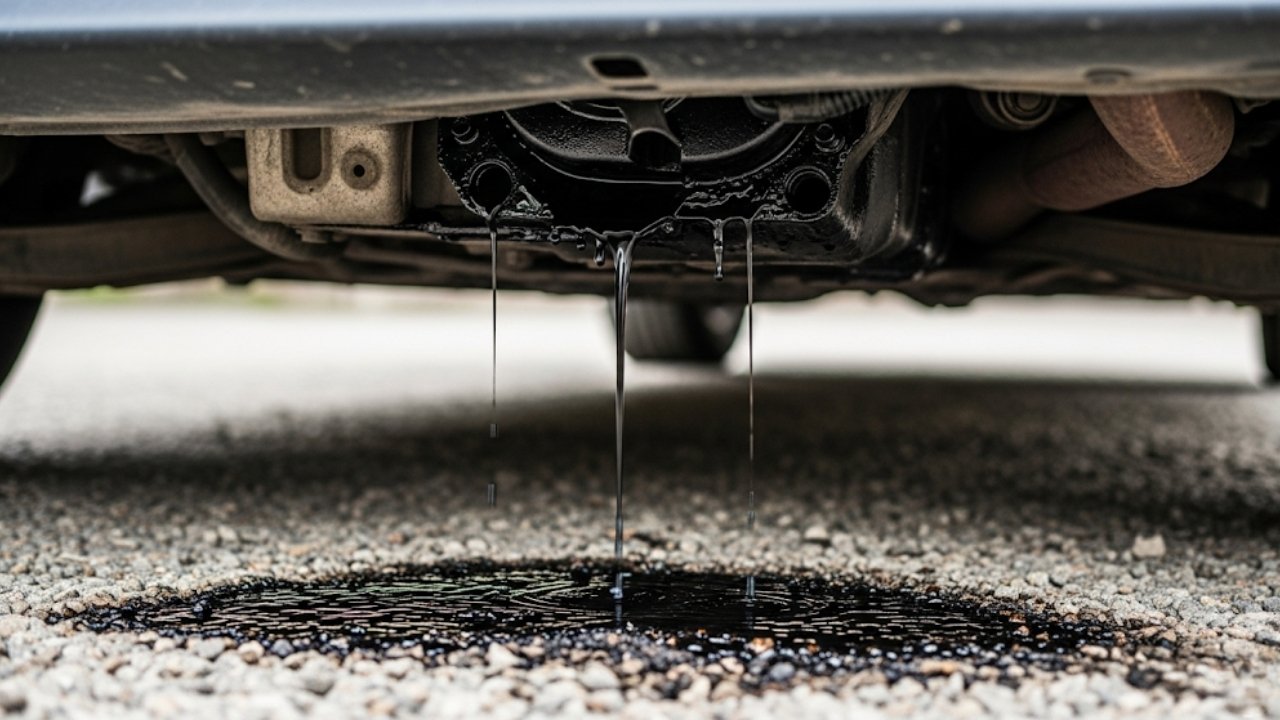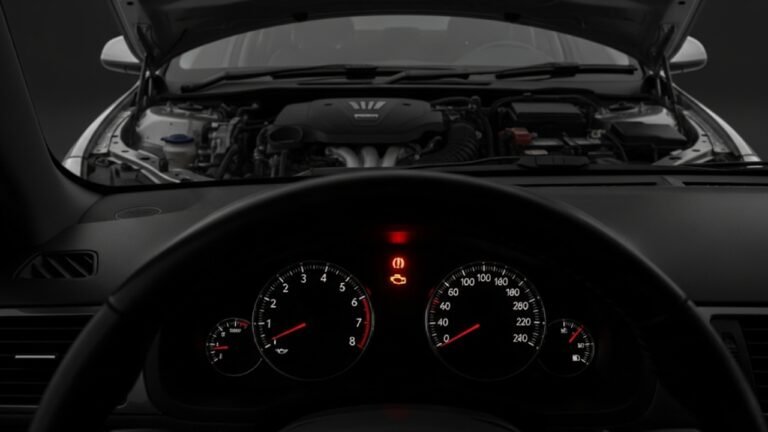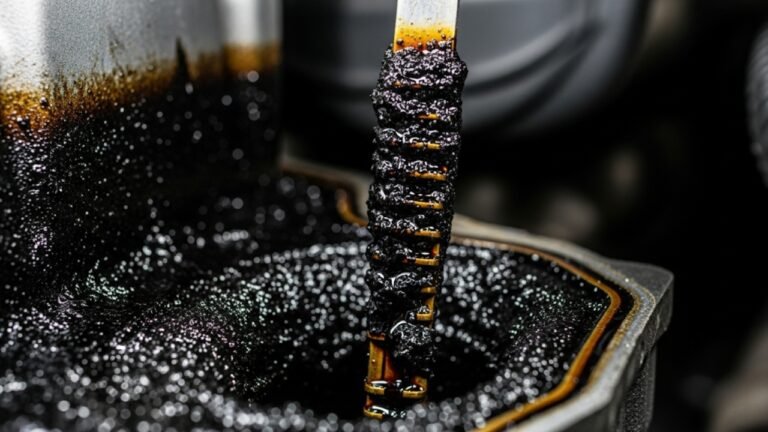Why Is Black Oil Leaking from Your Car?

Imagine this: you walk out on a sunny morning, coffee in one hand, keys in the other, ready to hit the road. Then you spot it—a nasty black oil leak under your car. Your mood? Instantly ruined. You might feel worried, frustrated, or even totally clueless. Don’t worry—you’re not alone.
A black oil leaking from car is a common issue many drivers face. It often shows up unexpectedly, like a bad surprise party. But the good news? It doesn’t always mean your engine is doomed. With a little knowledge and attention, you can figure out what’s wrong and fix it before things get worse.
This article is here to help you understand, diagnose, and respond to black oil leaks like a pro. Let’s get under the hood—both literally and figuratively.
In This Article
- 1 What Does It Mean When Black Oil Is Leaking from a Car?
- 2 Common Reasons for Black Oil Leaking from a Car
- 3 Symptoms That Come with a Black Oil Leak
- 4 How to Confirm It’s Black Engine Oil Leaking
- 5 Is It Safe to Drive with Black Oil Leaking from a Car?
- 6 How to Fix a Black Oil Leak in a Car
- 7 Prevention: How to Stop Oil Leaks Before They Start
- 8 Real Talk: My Own Experience with Black Oil Leaks
- 9 When to Worry: Red Flags You Shouldn’t Ignore
- 10 How to Monitor and Manage a Leak While You Wait to Fix It
- 11 Is Black Oil Always a Sign of a Problem?
- 12 Bonus Tips: Tools That Can Help You Detect Leaks
- 13 FAQs About Black Oil Leaking from a Car
- 13.1 1. Why is the oil from my car black?
- 13.2 2. Can I drive my car if it’s leaking black oil?
- 13.3 3. How expensive is it to fix a black oil leak?
- 13.4 4. How do I know if it’s really oil and not something else?
- 13.5 5. Can a black oil leak be fixed permanently?
- 13.6 6. Could it be my oil filter?
- 13.7 7. What should I do if the oil leak starts while I’m on the road?
- 14 Wrap-Up: Don’t Let a Black Oil Leak Ruin Your Ride
What Does It Mean When Black Oil Is Leaking from a Car?

Fresh oil is golden brown and gets darker with time. So if the oil on your driveway is pitch black, it’s probably been in your engine for a while. This tells you two things:
-
Your oil is overdue for a change.
-
There’s a leak somewhere in your engine’s oil delivery system.
Key possibilities include:
-
Worn-out gaskets or seals
-
A cracked oil pan
-
A loose or damaged oil filter
-
Leaks around the valve cover gasket
Let’s dive into each of these in detail. But first, here’s a quick comparison table to help identify the leak:
| Clue | What It Tells You |
|---|---|
| Color is black | It’s used engine oil |
| Smells burnt | Could mean overheating or old oil |
| Pool under front engine | Likely from the oil pan or filter |
| Drips when parked | More than likely a slow gasket leak |
| Engine light is on | Oil pressure might be low |
Common Reasons for Black Oil Leaking from a Car
1. Worn-Out Gaskets and Seals
Gaskets are like the peacemakers of your engine—they keep things sealed and separated. Over time, though, heat and pressure wear them down. Once they’re cracked or brittle, black engine oil can start leaking out.
Valve cover gaskets, oil pan gaskets, and timing cover gaskets are the usual suspects. The oil seeps through and ends up on your driveway like a silent protest.
Personal tip? My uncle once ignored a small oil leak from a valve gasket. It seemed harmless—until his engine started smoking during a road trip. What cost $80 to fix early on turned into a $1,200 engine rebuild.
Lesson: Don’t sleep on a leak.
2. Oil Pan Damage
Your oil pan is located underneath your engine. It holds all the oil before it gets pumped up to keep your engine lubricated. But it’s exposed—and sometimes, it gets damaged from road debris, potholes, or even speed bumps.
If you’ve hit something recently and now see black oil leaking from your car, check the oil pan. A hairline crack can cause a slow leak, while a larger hole could drain your oil completely.
The oil usually drips from the bottom, right behind the front wheels. Slide under with a flashlight and check if it’s wet and sticky down there.
3. Leaking Oil Filter or Oil Plug
This one’s simple but sneaky. If your oil filter wasn’t installed properly or your drain plug wasn’t tightened after an oil change, it could lead to black oil leaks. It’s like forgetting to screw the cap back on a bottle—it’ll leak eventually.
Oil filters and drain plugs need a firm but not overtightened grip. Over-tightening can damage the threads; too loose, and you’ve got yourself a leak.
Signs to look for:
-
Oil leaking right after an oil change
-
Oil collecting around the filter or plug area
-
No oil spots before the last service
Symptoms That Come with a Black Oil Leak
Sometimes the leak isn’t your only problem. It can bring along some friends:
-
Burning smell from oil hitting hot engine parts
-
Smoke from the engine bay
-
Oil light blinking on your dashboard
-
Rough engine sounds or knocking
-
Decreased fuel efficiency
If you notice any of these, your car’s not just leaking—it’s crying for help.
How to Confirm It’s Black Engine Oil Leaking
You don’t need to be a mechanic to do some detective work. Here are a few DIY checks:
Use These Simple Steps:
-
Place cardboard under the engine overnight to catch the leak.
-
In the morning, check the color and smell. If it’s thick, black, and smells burnt, it’s engine oil.
-
Look under the hood for wet spots or shiny areas near seals and bolts.
-
If you’re unsure, dab the oil with a white paper towel. Engine oil turns dark brown to black. Transmission or brake fluid will be reddish or light brown.
Is It Safe to Drive with Black Oil Leaking from a Car?
The short answer? Not really.
Even if your car seems to drive fine, you’re risking serious engine damage by ignoring the leak. Driving with low oil pressure is like running a marathon without water—your engine will overheat, parts will wear out faster, and you may face catastrophic failure.
If the oil leak is small, you may get away with topping off oil regularly and scheduling a repair. But a large or fast leak means you should stop driving immediately.
How to Fix a Black Oil Leak in a Car
Here’s the truth—fixing an oil leak ranges from DIY-friendly to mechanic-mandatory. Here are your options:
DIY Fixes (for small leaks):
-
Use high-mileage oil with leak-stopping additives.
-
Tighten your oil filter or drain plug.
-
Apply sealant to tiny gasket leaks.
-
Replace simple gaskets like the valve cover if you’re handy.
When to See a Mechanic:
-
Leak is large or fast.
-
You’re losing oil daily or weekly.
-
You spot smoke or burning smells.
-
Oil is leaking onto the exhaust manifold.
Costs can vary, but here’s a rough estimate:
| Repair Type | Average Cost (USD) |
|---|---|
| Valve Cover Gasket | $100 – $300 |
| Oil Pan Gasket | $200 – $600 |
| Oil Filter Replacement | $25 – $75 |
| Full Engine Seal Repair | $500 – $2,000+ |
Prevention: How to Stop Oil Leaks Before They Start
A little care goes a long way. Here are some easy habits that help prevent leaks:
-
Change your oil every 3,000–5,000 miles
-
Check under your car weekly for drips or stains
-
Listen for odd engine noises
-
Watch your dashboard for warning lights
-
Use quality oil and filters
-
Replace gaskets and seals before they wear out
Think of it like brushing your teeth—do it regularly, and you avoid expensive dental work. Same goes for your car.
Real Talk: My Own Experience with Black Oil Leaks
Let me tell you a story.
I was once driving an old Corolla that had clocked over 180,000 miles. One day, I noticed dark puddles in my garage. At first, I ignored it—”just a few drips,” I thought. Weeks later, the engine began knocking. I took it in, and guess what? A $20 valve cover gasket had turned into a $1,200 repair bill. Lesson learned.
That experience taught me something: oil leaks speak a language. If you listen early, you save big.
When to Worry: Red Flags You Shouldn’t Ignore
Sometimes a black oil leak is a whisper. Sometimes it’s a scream. Here’s when to worry:
-
Smoke under the hood – Oil hitting hot parts
-
Oil pressure warning light – Danger zone
-
Engine misfiring or stalling
-
You’re topping off oil every week
If you see any of these, don’t delay repairs. You’re burning oil, damaging parts, and risking total engine failure.
How to Monitor and Manage a Leak While You Wait to Fix It
Can’t fix it today? No problem—just manage it wisely.
Here’s what you can do:
-
Park on cardboard or drip pans
-
Check your oil level daily
-
Top off oil as needed
-
Use high-mileage or stop-leak oil to reduce leaking temporarily
-
Schedule a repair appointment ASAP
Think of this like wearing a bandage on a cut. It helps, but you still need a doctor’s visit.
Is Black Oil Always a Sign of a Problem?
Not always. Engine oil turns black naturally as it works. It’s how oil does its job—absorbing soot and metal from inside your engine. But when it starts leaking out, especially onto the ground, that’s your red flag.
So don’t panic if your dipstick shows dark oil. But if you find it under your car, it’s time to inspect further.
Bonus Tips: Tools That Can Help You Detect Leaks
These simple tools can save you stress and money:
-
UV dye kits – Add dye to your oil and use a UV light to find leaks.
-
Oil leak detectors – Spray-on powders that change color when exposed to oil.
-
OBD-II scanner – Read engine codes related to oil pressure issues.
These aren’t just for mechanics anymore—anyone can use them with a quick YouTube tutorial.
FAQs About Black Oil Leaking from a Car
1. Why is the oil from my car black?
Black oil usually means it’s used engine oil. Over time, oil collects carbon, debris, and microscopic metal particles from engine operation. If it’s leaking black, it likely hasn’t been changed recently and could be coming from a gasket, seal, or oil pan.
2. Can I drive my car if it’s leaking black oil?
It depends on the size of the leak. A small drip might let you drive short distances with regular top-offs. But if you notice constant drips, smoke, or warning lights, it’s best to tow it to a mechanic. Driving with low oil levels can destroy your engine.
3. How expensive is it to fix a black oil leak?
It ranges. Minor repairs like replacing an oil filter gasket can cost under $100. Major repairs like oil pan or engine seals can cost over $1,000. The longer you wait, the more it might cost.
4. How do I know if it’s really oil and not something else?
Check the color, consistency, and smell:
-
Black and thick = engine oil
-
Reddish = transmission fluid
-
Green/yellow = coolant
-
Clear = water (often A/C condensation)
You can also use a white paper towel to check the oil’s darkness.
5. Can a black oil leak be fixed permanently?
Yes, if you replace the worn part. Gaskets and seals don’t last forever, but when replaced correctly, they’ll hold for years. Use quality parts, and don’t skimp on oil changes. You’ll give your engine a longer, cleaner life.
6. Could it be my oil filter?
Absolutely. If it was installed poorly, overtightened, or has a defective seal, it can leak. A tell-tale sign is leaking right after an oil change. Luckily, this is an easy fix.
7. What should I do if the oil leak starts while I’m on the road?
Pull over safely. Check the oil level if you have a dipstick and top it off if it’s low. If the leak seems fast or severe, call roadside assistance. Better safe than sorry.
Wrap-Up: Don’t Let a Black Oil Leak Ruin Your Ride
Finding black oil leaking from your car can be unsettling—but it’s a problem you can solve with the right steps. Whether it’s a gasket, oil filter, or cracked pan, the key is early action.
Let’s recap the essentials:
-
Black oil = dirty engine oil leak
-
Don’t ignore smells, smoke, or oil lights
-
Confirm the source before guessing
-
Fix small leaks early to avoid big bills
-
Use good oil, check levels, and don’t skip services
You’ve got this. And if you’re ever unsure, just get a mechanic’s opinion. Spending $100 today might save you thousands tomorrow.






